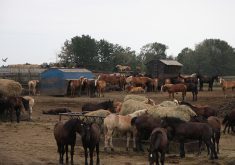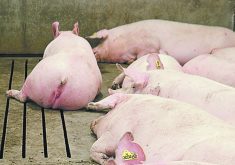Webinar told that improved communication is not only the responsibility of producers but also processors and retailers
Those raising livestock shouldn’t be afraid of being loud and proud of their profession, ethical treatment of their animals and the important part they play in feeding a hungry planet, stated a recent Canadian Centre for Food Integrity webinar.
Presenter Stéphane Beaudoin, president of Gestbeau Inc., said while Canada’s livestock producers are leaders in producing products that consider animal welfare, there is a weak spot in communicating that message to consumers.
According to public trust research conducted by CCFI, more than half of consumers surveyed in 2019 either didn’t know if livestock production is done humanely or were unsure.
Read Also

Saskatchewan throne speech promises strong economy
Saskatchewan’s legislative agenda for the coming year will focus on meeting the challenges of new world trading relationships, said the speech from the throne.
“We need to be bold and transparent. We need to show our score. We need to show that we invest in time, metrics and efforts and should also show perhaps how much of a dollar per pound is invested in animal welfare,” said Beaudoin.
Videos circulated by animal rights organizations can paint the entire industry in a bad light.
Some of the lack of understanding about animal welfare practices are caused by the separation many consumers have from agriculture, according to Beaudoin.
“The social acceptance of our meat production system is really important and we have to ensure we keep this trust level as high as we can,” he said. “It’s a matter of balancing values and facts to maximize the trust.”
Communication is key in that effort to maintain and gain public trust, said Beaudoin, explaining that producers need to show off their high standards and accountability.
“We need to show it, not only do it and get out of the closet, out of the sand and be camera ready,” he said. “Show off yourself, what you are doing right and back it up with using facts, verified and verifiable data.”
Producers work longer hours than any other profession, have compassion for what they do and respect the animals they raise, said Beaudoin, and those values are shared by consumers but need to be better communicated to them.
Processors must stress the care and requirements required in transportation and the skills required of workers carrying out slaughter.
Retailers can promote responsible sourcing of their products and should be knowledgeable about the process of how the meat goes from the farmgate to consumer’s plates.
Beaudoin said those opposed to Canada’s meat industry tap into consumers’ emotions. When countering those messages on social media, Beaudoin said it’s important to measure the reach of those making claims against the industry before engaging. And then, ensure arguments are fact-based while utilizing personal experiences.
“Don’t try to be provocative with the detractors,” he said. “Play with finesse and also keep a respective approach to any comments you make.”
















